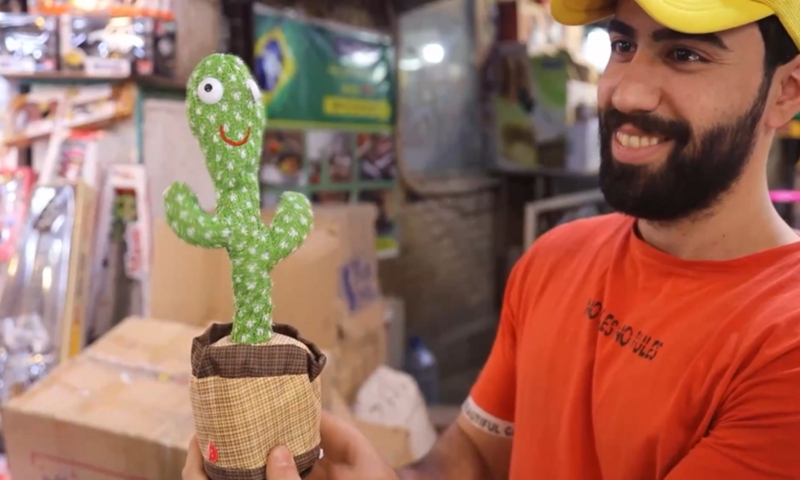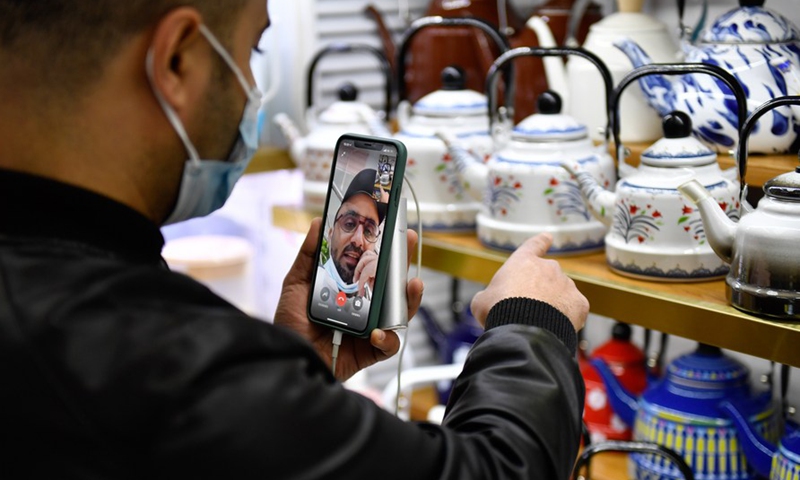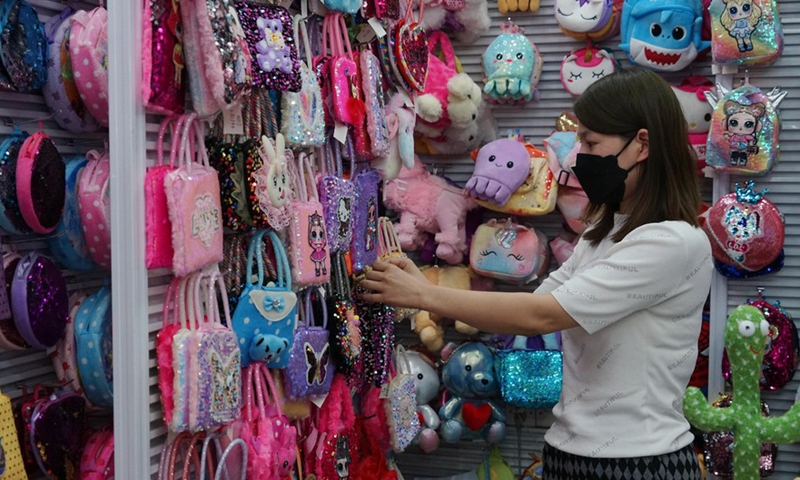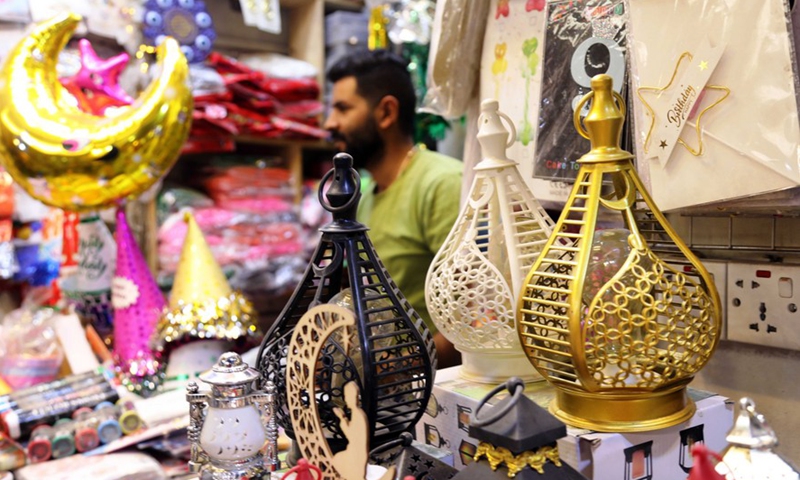
Video screenshot shows an Iraqi merchant demonstrating a fluffy cactus that can sing and dance at a market in Baghdad, Iraq, April 17, 2022.Photo:Xinhua
Colorful crystal lights, fluffy cactuses that can sing and dance... With the advantages of innovation, quality, and low price, smallware imported from Yiwu City, eastern China's Zhejiang Province, has grown popular among Arabs during the Muslim holy month of Ramadan this year.
Arab consumers perceive Chinese products as having good value in the face of inflation, Arab businessmen benefit from trading with China amid the COVID-19 pandemic, and Arab analysts think that China's economy provides strong vitality to the development of Arab countries at a time when the global economy is facing significant challenges.
GOOD VALUE FOR ARAB CONSUMERS
On the street of Abdel-Mohsen in Riyadh, Mohammed Mubarak, a Saudi Arabian customer, selected a made-in-China light as a gift for his friends.
"At a time when everything is rising in price due to inflation, Chinese lamps, which include a wide choice of well-made crystal ceiling lamps, wall lights, and flickering string lights, are of good value, making them favored Ramadan gifts for many Saudi shoppers," he said.
In central Baghdad, Iraq's capital, a wide variety of children's toys, including made-in-China boxes for Bobbi girls, toy cars, and fluffy cactuses are on display at Mohammed Maalleh's booth.
"Iraqi consumers love Chinese goods that are of good quality and low price, and we can ask the Chinese producers to change the design according to customers' personal demands," Mohammed, who has imported and sold Chinese commodities for more than 10 years, told Xinhua.
"Chinese manufacturers are capable of producing anything," he said. According to Mohammed, his business of selling Chinese items has been good despite the economic downturn.
The total value of exports of Yiwu City, dubbed as "the world's largest small commodity wholesale market," reached 365.9 billion yuan (some 55.37 billion US dollars) in 2021, a 21.7-percent increase year-on-year, according to statistics from Yiwu Municipal Bureau of Commerce.
RELIABLE PARTNER FOR ARAB TRADERS
As Arab customers consider Chinese commodities to be cost-effective, Arab businessmen have gained handsomely from trade with China.
Abdulrahman Alawwad, a Saudi businessman who has been trading with Chinese businesses for over 10 years, said his Chinese trading partners were "reliable and trustworthy."
The good momentum of trade between China and Saudi Arabia over the past few years was impressive, he said.
Saudi Arabia has long been China's largest trading partner in West Asia and Africa. The bilateral trade volume between the two countries in the first half of 2021 was 40.1 billion US dollars, an increase of 21.4 percent year-on-year, according to China's Ministry of Foreign Affairs.
"China plays a key role on the global market, especially at a time when the world is undergoing significant changes due to the COVID-19 pandemic and other economic challenges," said Abdulrahman.
STRONG DRIVE FOR ARAB ECONOMY
"The Egyptian-Chinese trade has witnessed a significant increase in volume during the past years, and it has also witnessed a leap in quality, as Egypt began to import high-end products from China," said Diaa Helmy, secretary general of the Egyptian-Chinese Chamber of Commerce.
Helmy said that the increase in bilateral trade includes both Chinese exports to Egypt and Egyptian exports to China, which "is a good sign of an improvement in the trade balance."
He sees China's economic development and resilience as positive for the global economy, especially for the developing countries, "because China is a developing country that supports development in Egypt, the Arab countries and the African continent."
Yarob Mahmoud, a professor of Economics at the College of Administration and Economics at the Al-Iraqia University in Iraq, shares the same view with Helmy.
"China has actively and positively contributed to the development of the economies of Arab countries, including Iraq," said Yarob.
Iraq was China's third largest trading partner among Arab countries in 2020, with bilateral trade reaching 30.18 billion US dollars, according to the Chinese Foreign Ministry.
"The statistics are clear evidence of China's active and positive role in helping and supporting the Iraqi economy during difficult times," Yarob said.

A Yemeni merchant is introducing prices of teapots to Saudi Arabian customers via video at Yiwu International Trade City in Yiwu City, eastern China's Zhejiang Province, Jan. 14, 2021.Photo:Xinhua

A Chinese merchant is sorting toys in a shop at Yiwu International Trade City in Yiwu City, eastern China's Zhejiang Province, March 29, 2022.Photo:Xinhua

Lanterns are sold at a market during the holy month of Ramadan in central Baghdad, Iraq, on April 16, 2022.Photo:Xinhua
